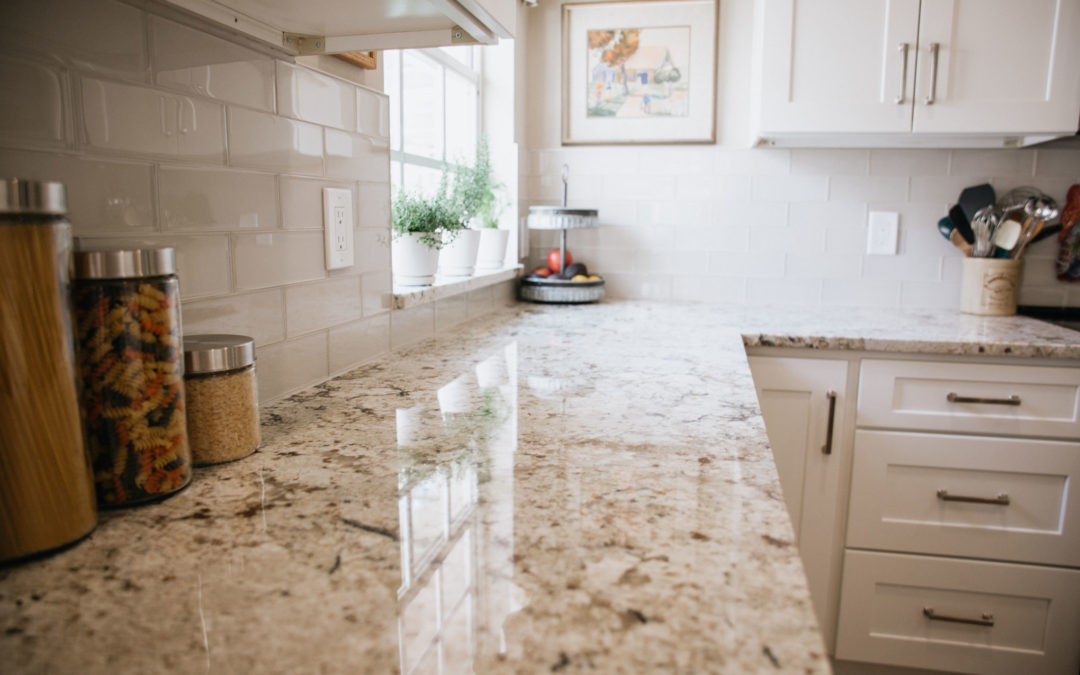Kitchen countertops get a lot of daily use and are often the focal point of a kitchen. We have recently discussed on this blog the various designs, styles, and benefits that certain countertop materials can bring to your kitchen. But what about those who only care about function instead of form? Today, we will focus on countertops resistant to germs, stains, and general uncleanliness. These countertops are fantastic for hectic households that can’t devote excessive amounts of time every day to cleaning but want to keep everyone safe.
Easy to Clean and Germ Repellant Countertops
If you don’t want to spend your time worrying about the potential germs and health dangers lingering on your kitchen countertop, the clear choice is a non-porous material. Porous materials that allow dirty water filled with germs and other nasty food prep leftovers to seep into the counter are magnitudes harder to clean effectively than non-porous countertops. You can significantly decrease the number of bacteria and other germs on your surfaces by choosing counter materials that passively and naturally deter them with their non-porous qualities.
Some of the most common countertops are, in fact, porous. Granite, for example, is a natural stone with pores that allows water to infiltrate the surface. Porous countertops are made possible by sealants that protect against water and other stains. While countertop manufacturers will include a sealant on materials that need it, the homeowner is also required to do regular upkeep to keep the countertop in mint condition. Factors such as heat resistance, style, weight, or hardiness, can cause you to prefer one countertop over the other. Still, you should always decide beforehand whether annually applying a sealant is something you want to keep on a checklist.
Types of Countertops
Now, let’s talk about some countertop materials, whether or not they are porous, and their ability to prevent germ buildup.
Quartz – Quartz is a non-porous ‘natural’ material manufactured to be very strong and durable. Quartz countertops combine natural stone with resins and other binding agents to create a beautiful and resilient finish. A quick wipe down with soap and water is enough to rid your quartz countertop of the most harmful germs. Quartz countertops are also scratch-resistant and perfect for busy households with kids. While quartz does not handle heat well, this downside can be mitigated by using quartz on most of your countertops but including a heat-resistant material on either side of your stove or oven.
Laminate – Laminate is a cheap but popular material found in many kitchens in America. Owing to its engineered smooth surface without many cracks, bumps, or edges, laminate countertops inhibit bacteria growth, as germs thrive when water soaks into the surface away from your cleaning cloth. Laminate is also cheaper than other options, meaning you have the ability to spend more on preventative measures like additional sealant without reaching the higher price points of other countertops.
Solid Surface Countertops – Solid Surface countertops were made to mimic stone while still providing a non-porous surface. They are also more resilient than laminate countertops and, to most homeowners, are easier on the eyes. They can be made from materials such as acrylic mixed with dust from genuine stones and resins for sealing and strength.
No matter your choice, you can seal your countertop and help turn a porous material into one better suited for cleanliness. When it comes to countertops, design often wins out!
West Coast Design Build Florida are expert at designing and installing beautiful kitchens – no matter your budget or price range. Call today for a design consultation and to learn more about your countertop and kitchen remodel options.


Recent Comments